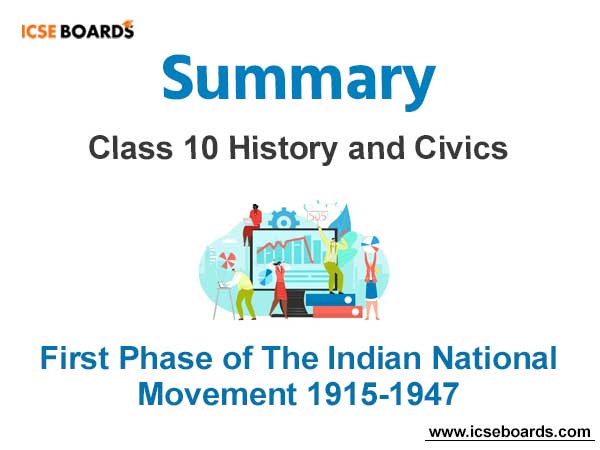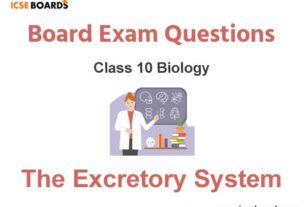Students should refer to First Phase of The Indian National Movement Class 10 ICSE notes provided below which has been designed by ICSE Class 10 History teacher based on the latest syllabus and examination guidelines for ICSE Class 10 History. You should carefully read through and understand all topics of this chapter given below so that you can learn the concepts given in Chapter First Phase of The Indian National Movement which will be very useful if you use them prior to your History exams.
ICSE Class 10 History First Phase of The Indian National Movement 1915 to 1947 Summary
We have provided below a summary of Chapter First Phase of The Indian National Movement 1915 to 1947. This is an important chapter in Standard 10th ICSE History. The summary provided below has been prepared by expert History faculty for ICSE based on the latest ICSE books. You should refer to all Chapter Summaries ICSE Class 10 History which will help you to understand all chapters and to get more marks in exams.
First Phase of The Indian National Movement 1915 to 1947 ICSE Class 10 History
Scope of syllabus:
• Objectives and methods of struggle of the Early Nationalists.
• Any 2 Contributions of Dadabhai Naoroji, Surendranath Banerjee, Gopal Krishna Gokhale.
INTRODUCTION
The three phases of the Indian National Movement were:
• The Early Nationalist Phase [1885-1907]
• The Assertive Phase [1907-1916]
• The Gandhian Era [1915- 1947]
In its initial years, the Congress was led by a group of leaders known as the Early Nationalists and led by following leaders.

BELIEFS OF THE EARLY NATIONALISTS
• They had faith in the sense of justice, fair play, honesty and integrity of the British.
• They believed that the British would grant ‘Home Rule’ of Indians.
• They believed that the British rule had many benefits. E.g. it aided in cleansing social ills, like sati, untouchability and child marriage.
• They relied on constitutional and peaceful methods to achieve their aims and believed in patience and reconciliation instead of violence and confrontation.
METHODS OF THE EARLY NATIONALISTS
Constitutional agitation method was followed by the Early Nationalists. It had two objectives: –
Objective 1: Educate people in India in modern politics, to arouse national political consciousness and to create a united public opinion. For this purpose, they relied on the methods such as:
• Holding meetings where speeches were given and resolutions for popular demands were passed.
• Use of the press to criticize government policies.
• Sending memorandums and petitions to government officials and the British Parliament.
Objective 2: Influence the British government and the British public. For this purpose, they relied on the methods such as:
• Making use of three P’s i.e. Petitions, Prayers and Protest. They sent petitions, letters of protest to the British Government demanding their attention to look at the problems of fellow Indians.
• A British committee of the Indian National Congress was set up in London, which published a weekly journal ‘India’ to present India’s case before the British.
• Deputations of Indian leaders were sent to Britain where the leaders exercised active propaganda in Britain.
CONTRIBUTIONS OF EARLY NATIONALIST LEADERS
Dadabhai Naoroji – India’s Unofficial Ambassador
• He was popularly known as the ‘Grand Old Man of India’.
• He was looked upon as India’s unofficial Ambassadar, fighting for the causes of his country.
• He founded ‘London Indian Society’ in collaboration with W.C. Banerjee to publicize grievances of Indians.
• He was the first Indian to become the member of the British House of Commons in England.
• He was in favour of appointing educated Indians to high posts.
• It was due to his efforts that the House of Commons passed a resolution for holding the ICS Examination in England and India simultaneously.
• He founded the East Indian Association in London. [Kolkata, Mumbai and Chennai – branches].
Role in Congress
• He took an active part in the foundation of INC and was elected as president thrice.
• Resolutions on self-Government, Boycott, Swadeshi and National Education were passed by the congress under his presidentship.
Exposed economic ills of India
• His views on Indian economy are given in his work titled – ‘Poverty and Un-British Rule in India’.
• His famous Brain Theory explained how India’s wealth was being ‘drained to England through various ways.
His literary works
• He edited the newspaper Rast Goftar [‘Speaks of Truth].
• He started a magazine ‘Dharma Marg Darshak’.
Gopal Krishna Gokhale
• He was awarded the title of C.I.E. [Companion of the Indian Empire]
Pursuaded British for Reforms
• He favoured the use of constitutional means to achieve his goals. He opposed the policies of the British Government on issues such as-
a) Incurring huge expenditure on the British army.
b) Adopting the policy of racial discrimination in appointments to high posts.
c) Imposing production tax on cotton.
• He made a strong plea for the reform of the Legislative Councils and separation of judiciary from the executive.
• Played an important role in the passage of Minto-Marley reforms.
• Served a member of Indian Public Service Commission.
Servants of India Society
• He set up the Servants of India Society [1905]
a) Main aim of society was to train national leaders who would dedicate themselves to the service of India.
b) It worked for the elevation of depressed classes.
c) It assisted educational movements especially those which were for the education of women.
Role as a member of Imperial Legislative Council
• He became the members of Imperial Legislative Council.
• He pleaded in the Council from reduction in salt-duty and abolition of excise duty on cotton goods.
• He impressed upon the Government to reduce land revenue.
• He demanded radical changes in the fiscal policies and better jobs for the educated middle class.
• ‘Opposition where necessary, co-operation where possible.’
Surendranath Bannerjee
• He was popularly known as ‘Father of Indian Nationalism’.
• He was elected as a member to the Calcutta Corporation for nearly 2 decades.
• He was elected to the Bengal Legislative Council four times.
• He was appointed as Minister of Self-Government and Health by the Governor of Bengal. First Indian to hold that position.
• He founded Indian Association. Its aims were to educate the people, to create strong public opinion in the country, and arouse political consciousness and unity.
• To create an all- India political organization, he convened the Indian National Conference at Kolkata.
• His Indian National Conference merged with Indian National Congress. He presided over 2 sessions of the congress.
• He edited a newspaper, Bengalee which served as a powerful medium for mobilizing public opinion.
• His book ‘Nation in The Making’, gives an account of his political concern and his views about self- government.
• He started agitation against License Act, Arms Act, Vernacular Press Act and against lowering the age from 21 to 19 to appear in the ICS Examination.
• He opposed Morley-Minto reforms, which introduced separate electorates for Hindus and Muslims.
• He opposed partition of Bengal by Lord Curzon in 1905.
IMPORTANT EVENTS, YEARS & DATES




